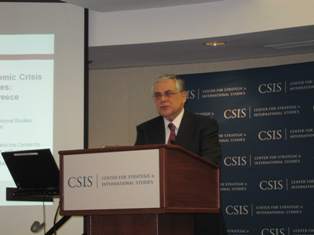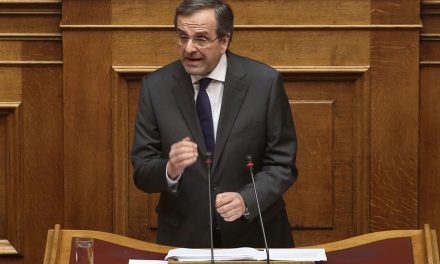By Landon Thomas Jr., New York Times
Many investors are worried that an election later this month may produce a new radical government in Greece.
Alexis Tsipras, the leader of an unruly band of left-of-center political parties, is favored to win on Jan. 25. He has talked of restructuring Greece’s debt and rolling back harsh austerity measures, and has raised questions about the conduct and management of Greece’s sickly banks.
All of which has come as a shock to investors, who over the last year have piled into Greek bonds and banks, wagering that the country was primed to recover from a five-year depression that wiped out a quarter of the country’s gross domestic product.
The concern now is that Mr. Tsipras, in challenging Europe on these thorny issues, will force Greece into default and perhaps a messy exit from the euro — an event that could unleash a new wave of investor contagion.
Some analysts, however, are advancing an alternate view: that a radical new Greek government would not be that radical after all.
Jens Bastian, a financial analyst based in Athens, notes that Mr. Tsipras’s core argument — that Greece’s onerous debt is not sustainable and should be reduced — has also been put forward by one of Greece’s larger creditors: the International Monetary Fund.
“It was the I.M.F. that kick-started the idea of restructuring Greece’s debt with Europe,” Mr. Bastian said. “Mr. Tsipras can say we are in line with the I.M.F. — we just want to talk to our European partners about the debt.”
This is hardly a radical notion, Mr. Bastian argues.
Perhaps. But that also means that European taxpayers — particularly those in Germany — will have to absorb the full brunt of the haircut as the I.M.F., by tradition, does not allow its debts to be restructured.
Greece’s official creditors in the eurozone hold 65 percent of the country’s debt load of 317 billion euros. Private sector investors, whose bonds were restructured in 2012, hold just 15 percent. These investors range from mutual funds like Putnam Investments and Capital Group, which own the restructured bonds, to vulture funds that did not participate in the bond swap.
The I.M.F. and the European Central Bank make up the rest.
Yanis Varoufakis, an economist and adviser to Mr. Tsipras, says that a Tsipras-led government would not make a private sector haircut a priority — an outcome that many foreign investors now fear.
Instead, Mr. Varoufakis proposes a grand bargain of sorts by which Europe agrees to exchange its current obligations for new Greek bonds that are linked directly to Greece’s economy. If the economy grows, as it is expected to this year, bondholders receive a nice return; if it does not, the bonds pay nothing.
“We are turning Europe into a partner for growth as opposed to a partner for austerity,” Mr. Varoufakis said in a recent interview. “This fiscal waterboarding has to end.”
Mr. Varoufakis is quick to add that such a plan does not signal a return to the days of government profligacy, and he says that the government will not suddenly abandon the many structural reforms Greece has put in place to secure €226 billion, or $266 billion, in loans since 2010.
An increasing number of economists have begun to argue that this tremendous infusion of cash — 125 percent of Greece’s total economy — has done little to help the country itself. According to an analysis by Macropolis, a Greek news website, of this amount only 11 percent has been directed toward the Greek state. A majority was used to bail out Greece’s creditors and its banks.
So Mr. Varoufakis is insistent in saying that what Greece — not to mention broader Europe — needs now is a huge public spending program, similar to the New Deal that helped lift the United States out of a depression in the 1930s.
And he has proposed using the European Investment Bank, which is owned by European Union member states, as the lead investor in this respect.
Persuading a divided Europe, hung up on balancing budgets and reducing debt, to support such a notion borders on the fanciful. But the bond swap, while no less ambitious in its complexity and scope, might at least serve as a starting point for a conversation that debt experts say can no longer be avoided.
Greece’s debt, at 177 percent of G.D.P., is second only to Japan’s. And while many of the maturities on these loans have been extended 20 years into the future, so that Greece’s annual interest rate burden has become fairly low, the overhang casts quite a pall, making it hard for the country to secure cheap long-term loans.
For such a swap to work, says Glenn Kim, an investment banker who advises European governments on their debt strategies, two things need to happen: The debt reduction for Greece has to be large enough to make a difference and Germany has to be able to sell the deal to its taxpayers.
“Someone has to take some pain somewhere,” Mr. Kim said.
For skeptics, this is the rub.
A growing number of hedge funds have started to establish short positions in Greek government bonds, betting that their prices will continue to fall. The view is that if European governments do agree to take a loss on their Greek loans, public pressure will demand that private sector bond investors share in the pain, even though their bonds were restructured in 2012 and their share of the total debt is quite small.
“I can’t see how the official sector will agree to a restructuring without also getting the private sector to share the burden,” said David Salanic of Tortus Capital, who is currently betting that the five-year Greek bonds issued last year will experience a trimming of some sort.
Mr. Salanic is not alone in his sentiments.
Issued with yields of just under 5 percent, the bonds now carry an interest rate of 12.5 percent; investors dumped them en masse once Mr. Tsipras emerged as a potential Greek leader.
A victory for Mr. Tsipras is not guaranteed. Recent polls show his 4 percent lead over the governing party of Prime Minister Antonis Samaras to be narrowing, as Mr. Samaras and European leaders have warned ominously of Mr. Tsipras’s radical bent.
“I am surprised to see these political interventions,” said Mr. Bastian, the consultant based in Athens. “Because they really speak little to what Mr. Tsipras has actually been saying since 2012.”



















